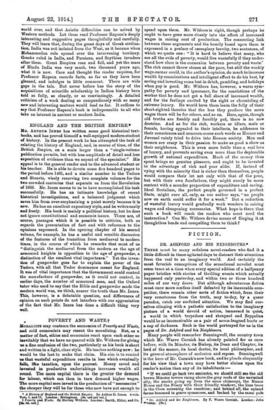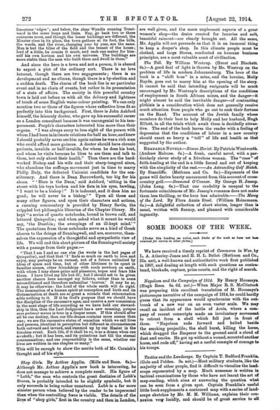FICTION.
DR. ASHFORD AND HIS NEIGHBOURS.•
THERE must be many sedulous novel-readers who find it a little difficult in these agitated days to distract their attentions from the real to an imaginary world. And certainly the most feverish conceptions of the sensational novelist must seem tame at a time when every special edition of a halfpenny paper bristles with stories of thrilling events which actually happened only yesterday, and within two or three hundred miles of our very doors. But although adventurous fiction must once more confess itself defeated by its inexorable com- petitor, there remain other sorts of fiction which, from their very remoteness from the truth, may to-day, by a queer
paradox, catch our surfeited attention. We may find our- selves clinging with a pathetic satisfaction to the imaginary
picture of a world devoid of action, immersed in quiet, a world in which torpedoes and shrapnel and Zeppelins would be as inconceivable as a pair of seven-leagued boots or a cap of darkness. Such is the world portrayed for us in the pages of Dr. Ashford and his Neighbours.
Many people will remember Sunningwell, the country town which Mr. Warre Cornish has already painted for us once before, with its Minster, its Bishop, its Dean and Chapter, its lord of the manor, its local doctor, its local philosopher, and its general atmosphere of seclusion and repose. Sunningwell
is the hero of Mr. Cornish's new book, and he pleads eloquently for his view that a town may have better claims upon the reader's notice than any of its inhabitants:— "If we could go back two centuries, we should still see the old brown Minster towers rising above the gray roofs of the unvisited city, the smoke going up from the same chimneys, the Manor House and the Friary with their friendly windows, the lime trees in the Close screening the sunshine; and behind all, the upland farms bosomed in grave sycamores, and backed by the same pale • Da Ashford and Its Beighteure. By F. Wane comical. liOndon: John srozzay. [6e.] limestone edges ' ; and below, the clear Wyndle running Trent- ward in the same loops and links. Nay, go back two or three centuries more, and though the leaser buildings are different, the Minster rises in its place, the town gathers at its foot, the hills, the woods, and the river, changing year by year, are the same. Man is but the tiller of the field and the tenant of the house ; lord of a little, he counts it much, and each one makes for him- self his own horizon and his own universe. The buildings are more stable than the men who built them and dwell in them."
And since the hero is a town and not a person, it is absurd to expect a plot of the ordinary sort. There is no love interest, though there are two engagements ; there is no development and no climax, though there is a by-election and a sudden death. The charm of the book lies in no particular event and in no chain of events, but rather in its presentation of a state of affairs. The society in this peaceful country town is laid out before us with all the delicacy and lightness of touch of some English water-colour painting. We can only mention two or three of the figures whose reflective lives fit so perfectly into this background. First, there is John Ashford himself, the leisurely doctor, who gave up his successful career as a London consultant because it was uncongenial to his tem- perament. People's characters interested him more than their organs. "I was always sorry to lose sight of the person with whom I had been in intimate relations for half an hour, and knew I should probably never see him again unless he was a rich man who could afford more guineas. A doctor should have chronic patients, invalids or half-invalids, for whom he does his best, and whom he visits because he likes to see them and talk to them, not only about their health." Then there are the hard- worked Bishop and his wife and their sharp-tongued niece, who abandons the suffrage movement just in time to marry Philip Daly, the defeated Unionist candidate for the con- stituency. And there is Dean Barrowforth, too big for his shoes. " Hero is the Dean,' said Ashford, 'sitting in the street with his toys broken and his fists in his eyes, bawling, " I want to be a bishop !" It is indecent, and it does him no good; he will never be a bishop.' " Upon all these and many other figures, and upon their characters and actions, a running commentary is provided by Henry Savile, the crippled but philosophic librarian of the Chapter library. He kept " a series of quarto notebooks, bound in brown calf, and lettered Quisquilize ; and when asked what it meant he would say, 'the Dustbin ; the sweepings of an ill-kept mind." The quotations from these notebooks serve as a kind of Greek chorus to the doings of Sunningwell, and are, moreover, them- selves the expression of a thoughtful and sympathetic view of life. We will end this short picture of the Sunningwell society with a passage from their pages :—
" That I am I and no one else (he wrote in the last pages of Quisquilin), and that that finds so much on earth to love and enjoy, may perhaps be an earnest, not of a future unlimited by ideas of space and time, but of other lifetimes to be spent in familiar scenes, other friendships with souls newborn on earth, with whom I may share pains and pleasures, hopes and fears like these. I have lived my life but ill; but I should ask to be given another chance here amongst my fellows, rather than in some unconditioned and therefore unfamiliar heaven.' It may be so, it may be otherwise: the Lord of the whole earth will do right. The incarnation of a human spirit at conception and birth and its disinoarnation at death are so great a miracle that reincarnation adds nothing to it. If it be God's purpose that we should have the discipline of the successive ages, and receive a new commission in the next stage of life according as we have held our steward- ship in this, then the Last Judgment has a new meaning, quisque suns patimur manes is true in a deeper sense. If this should after all be our destiny, then our life-drama contains more scenes than one ; we are the successive states of sensation which we call lives and persons, identical in perception but different in circumstances both outward and inward, and summed up by our Master in the timeless event. Each life, if it shall be so, is as a dream when one awaketh ; but it has been, and its pulsations last till the eternal consummation; and our responsibility is the same, whether our lives are written in one chapter or many."
This will be enough to show the merits both of Mr. Cornish's thought and of his style.



































 Previous page
Previous page